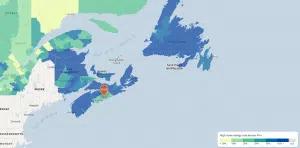You know the old adage, “Can’t complain; who’d listen anyway?”
Well, the provincial NDP wants people to know, they’re listening.
The party launched a new online survey, asking Nova Scotians to share stories of how the cost of power is affecting their lives.
“People are struggling to pay their power bills, especially as the cost of living, food and housing soar. We want to hear from people about the impact that higher power bills will have on their lives,” said Claudia Chender, NDP Natural Resources and Renewables spokesperson.
The online form opened for comments from the public on Thursday, May 12, as Nova Scotia Power’s (NSP) application to hike power rates for users by 10 per cent is working its way through the Utility and Review Board (UARB) process.
The Energy Efficiency Act – Bill 128
On March 31, Chender introduced a bill in the legislature that would help lower power bills for Nova Scotians, while also addressing the climate emergency.
The bill proposed creating an energy efficiency resource standard, a plan to eliminate oil heat in the province by 2050, creating an income threshold for Nova Scotians to access low-income energy efficiency programs and holding NSP accountable for infrastructure failures.
At the second reading of the bill, Fellow NDP cabinet minister Susan Leblanc spoke about the need to make energy more affordable, referencing the devastating heat wave that contributed to hundreds of sudden deaths in BC last summer, many of whom were elderly.
“We have a very high population of older Nova Scotians here in this province. We need to prepare for the possibility of severe weather events as well as the fact that our Summers are getting hotter,” Leblanc said in the legislature.
More than 21 percent of Nova Scotia’s population is over 65 years old, the third-highest percentage in the country.
The Houston government voted against the proposed changes because they are looking at the current relationship between NSP and ratepayers
Energy Poverty in Nova Scotia

Canadian Urban Sustainability Practitioners qualifies households spending over 6 per cent of its after-tax income meeting its home energy need as experiencing energy poverty.
An interactive map put out by the Canadian Urban Sustainability Practitioners (CUSP), shows Nova Scotia has high rates of energy poverty — a phrase that refers to the experience of households and communities struggling to heat and cool their homes and power lights and appliances.
According to the map, Nova Scotia has the third-highest rate of energy poverty in the country.
Last week, at the public accounts committee, the Deputy Minister and NSP reps backed an idea for a universal power service program. That would allow the UARB to include affordability as a criteria for setting power rates.
The NDP has been granted intervenor status in the hearing to review NSP’s application to increase power rates. That hearing will get underway in September.










